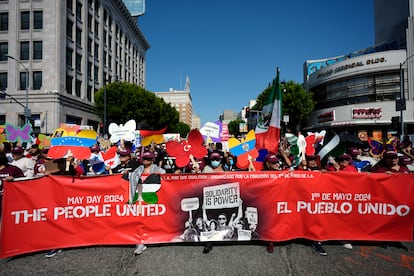May Day protests: What you need to know about the anti-Trump marches
Organizers say it is the start of a year-long campaign of protests, strikes and direct action

On May 1, 2025, workers, students, immigrants and activists across the United States will take to the streets for a National Day of Action, a mass mobilization inspired by the historic tradition of May Day, also known as International Workers’ Day. In big cities and small towns alike, there will be a coordinated series of protests by people demanding a future that works for working families, not just billionaires.
May Day
May Day has long been a symbol of workers’ resistance, with its origins dating back to the Haymarket of 1886, when Chicago workers went on strike to demand an eight-hour workday. Since then, the date has been used not only to recognize workers’ rights, but to demand needed changes. Organizers of the May Day protests revive that spirit and adapt it to today’s struggles: low wages, rising costs of living, inadequate health care and a political climate that they say threatens the dignity and rights of workers across the country.
This year’s May Day action has been described as especially urgent. Organizers say it is the beginning of a year-long campaign of protests, strikes and direct actions.
What are the protesters’ demands?
There are several causes that people across the United States will be marching for, including opposition to President Donald Trump’s immigration and economic policies.
Better wages
Workers are demanding a federal minimum wage of at least $20 an hour, an amount organizers say is needed to cope with inflation and skyrocketing housing costs. They are also calling for:
- Greater union protection
- Facilitate the organization of worker cooperatives
- Mandatory paid leave and parental leave
- Comprehensive benefit packages
The movement highlights the contrast between rising corporate profits and stagnant wages. While inflation has risen more than 7% in the last year, many workers have not seen a corresponding increase in their wages or benefits. Meanwhile, billionaires have doubled their wealth during the Covid-19 pandemic.
Cancel student debt
With nearly 41 million Americans burdened by $2 trillion in student loan debt, protesters are calling for it to be eliminated entirely.
Universal healthcare for all
Protesters demand a national healthcare system that prioritizes people over profits. They cite privatization of public services and the influence of hedge funds in healthcare as examples of the systemic rot they want to replace with equity and access.
A stand against Trump and the rule of billionaires
This year’s protests are also driven by opposition to Donald Trump’s second term and the policy changes made under his administration. Protesters are against Trump’s alliances with corporate interests, immigrant deportations and deep cuts to federal agencies, especially those related to public welfare and education. The movement warns of a “race to the bottom” orchestrated by Trump and figures like Elon Musk, who now heads the controversial Department of Government Efficiency (DOGE).
Organizers say this is a “war on working people,” and seek to fight back with community, solidarity and determination.
Where the protests will take place
Protests are planned in all 50 states under the slogan “50501,″ symbolizing 50 actions in 50 states for a common cause. These include:
- Iowa City: Great March “Aquí Estamos” (titled in Spanish) for immigrant workers’ rights.
- New Orleans: Rally to “Stop the Billionaire Takeover”
- Dallas (April 27): Pre-May Day March for federal and immigrant workers’ rights
- Palm Springs (May 3): Post-May Day rally
An event map is available on the organizers’ website that allows participants to find actions near them or create their own. The site also offers tools for organizing local activities.
The organizers have mentioned that all May Day actions will be based on nonviolence, with a clear message to de-escalate tensions and focus on unity. They state that this is not just a protest, but a community movement based on care, cooperation and mutual aid. The hashtag #MayDay2025 will be used throughout the event.
Sign up for our weekly newsletter to get more English-language news coverage from EL PAÍS USA Edition
Tu suscripción se está usando en otro dispositivo
¿Quieres añadir otro usuario a tu suscripción?
Si continúas leyendo en este dispositivo, no se podrá leer en el otro.
FlechaTu suscripción se está usando en otro dispositivo y solo puedes acceder a EL PAÍS desde un dispositivo a la vez.
Si quieres compartir tu cuenta, cambia tu suscripción a la modalidad Premium, así podrás añadir otro usuario. Cada uno accederá con su propia cuenta de email, lo que os permitirá personalizar vuestra experiencia en EL PAÍS.
¿Tienes una suscripción de empresa? Accede aquí para contratar más cuentas.
En el caso de no saber quién está usando tu cuenta, te recomendamos cambiar tu contraseña aquí.
Si decides continuar compartiendo tu cuenta, este mensaje se mostrará en tu dispositivo y en el de la otra persona que está usando tu cuenta de forma indefinida, afectando a tu experiencia de lectura. Puedes consultar aquí los términos y condiciones de la suscripción digital.









































